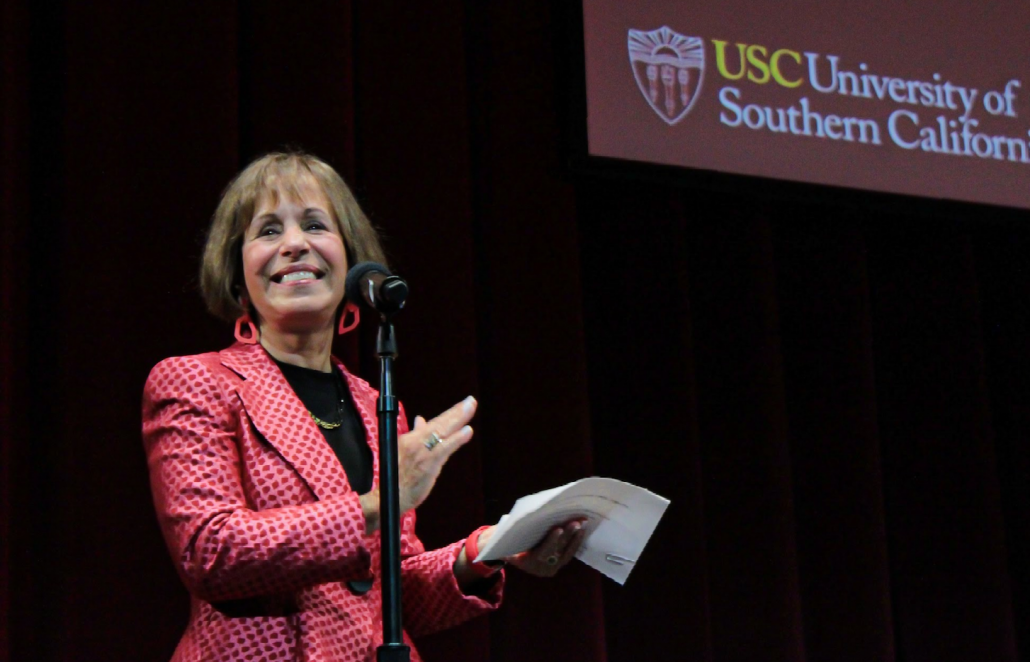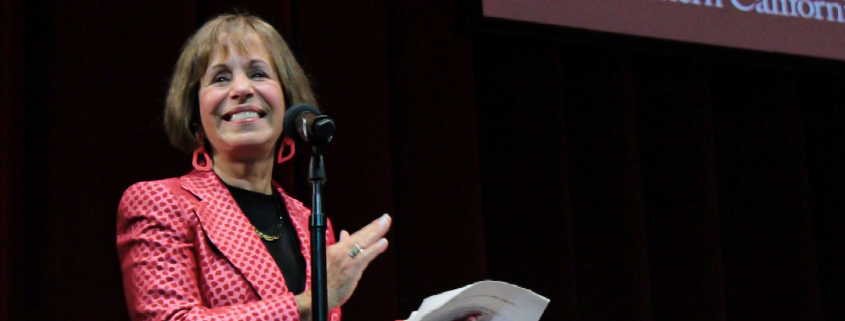Faculty Symposiums showcase innovation, research

(Krystal Gallegos | Daily Trojan)
Alumni, faculty and students gathered at Bovard Auditorium Thursday for the University Park Faculty Symposium celebrating research projects from 11 professors that focused on topics like sustainability, social change and mobility.
Folt opened the presentation with praise for the Health Sciences Campus Symposium, which took place one day prior and for the interdisciplinary nature of the research being done on campus.
Antonio Bento, a professor of public policy and economics, and Mahta Moghaddam, a professor of electrical engineering, opened the symposium by presenting their research project, the USC Center for Sustainability Solutions. The center, which opens next semester, aims to encourage conversation about climate change that will inspire the University and government bodies to create change.
“I believe the future of the green economy starts here in Los Angeles,” said Bento, who is also the director the Center for Sustainability Solutions. He pointed specifically to the Los Angeles Green New Deal, county sustainability plans and the 2028 Olympics as platforms for community aspirations.
Bento said the city can design policy so that stakeholders will pay fees for causing environmental damage. The center’s project will also discuss technology that could solve climate change issues like air pollution and will highlight specific devices USC can use to address environmental issues on campus.
Also addressing issues relevant to downtown L.A., Eric Rice, associate professor at the Suzanne Dworak-Peck School of Social Work and co-founder of the USC Center for Artificial Intelligence in Society, focused his research on using artificial intelligence to help tackle HIV among homeless youth. Rice used AI to navigate social networks within the homeless community in Los Angeles and target certain members for a safe-sex training program.
“We train them in leadership skills and communication skills and empower them to go back out into their communities and spread the word about sexual health with their friends,” Rice said.
Realizing that youth would rather learn from their peers than adults, they implemented a system where the young people they train dispersed the information they learned to the rest of the community. Analyzing statistics from the project, it appears that this method has helped to ameliorate the issue of HIV among homeless youth at large.
Jennifer McQuiston Lott, an assistant professor of practice at the Kaufman School of Dance, and Andrew Norman, an associate professor of composition at the Thornton School of Music created a short film that combined contemporary choreography and chamber music composition.
The film, titled “Caught in the Chamber,” looks at how music and dance can complement and enhance one another.
“In the end, we learned quite a lot from each other … and from our incredible performers and as with all great collaborations, the questions just get more questions and more opportunities for potential exploration” Lott said.
Lott and Norman announced they are in the process of creating the second installment of the project, “Activated Chambers,” which will premiere in December.
Allissa Richardson, an assistant professor of communication and journalism, gave the final presentation, titled “Bearing Witness While Black,” which focused on the impact of new technology like smartphones on journalism. Richardson discussed case studies of historical events that highlighted police brutality and the effect of mobile journalism.
“Ten years ago, I started the first mobile journalism laboratory, and at the time I called it the MOJO lab,” Richardson said. “In this MOJO lab, my [students] went around with nothing but tablets and cell phones asking people questions, big and small.”
She discussed the accessibility that smartphones provide, allowing anyone to document and broadcast important events. Richardson specifically highlighted Black history and the empowerment mobile journalism has given rise to.
Folt offered a few closing statements and more praise after the presentations had concluded. She expressed admiration and gratitude for the work being done by her colleagues.
“There’s courage, humor, grace, the future hard-cutting look at virtually everything we would want a university to be looking at, and that was just in 11 talks,” Folt said.

